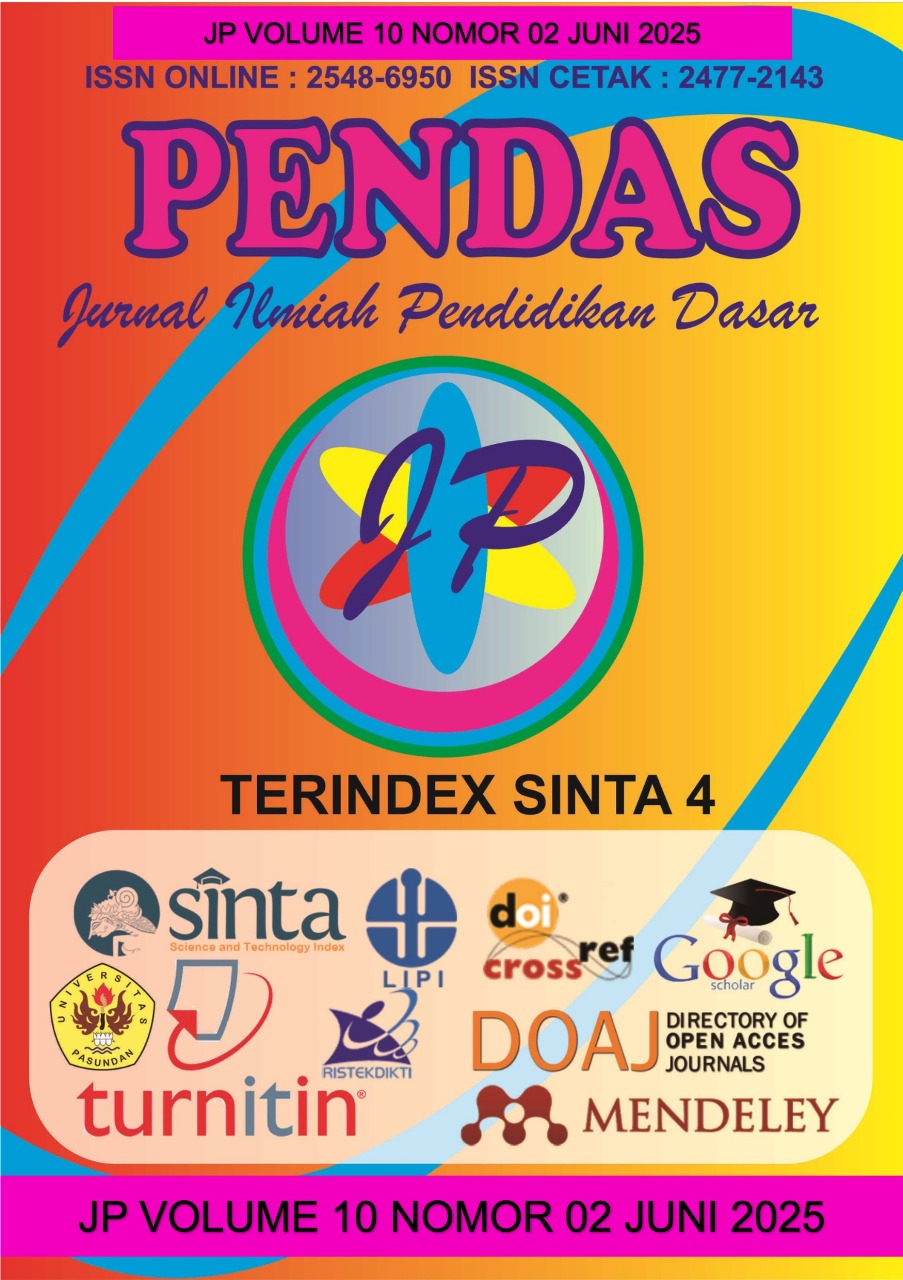IMPLEMENTASI SOCIAL EMOTIONAL LEARNING (SEL) DALAM MEMBANGUN LINGKUNGAN INKLUSIF DI SEKOLAH DASAR
DOI:
https://doi.org/10.23969/jp.v10i2.32386Keywords:
social emotional learning, socio emotional skills, Insclusive EducationAbstract
The demands of modern society require children to possess strong social-emotional skills, especially in inclusive elementary school settings where students come from diverse backgrounds and have various needs. This study aims to explore the implementation of Social-Emotional Learning (SEL) as a strategy to foster an inclusive learning environment, enhance students’ emotional well-being, and improve their social interaction and academic performance. This descriptive qualitative research employed data collection techniques including observation, interviews, and documentation. The results reveal that SEL helps students including those with special needs recognize and manage their emotions, build positive relationships, and develop empathy toward differences. Strategies applied by teachers include positive reinforcement, storytelling focused on emotions, and cooperative learning. However, several challenges persist, such as limited teacher training and the lack of systematic implementation guidelines. Overall, the study affirms that SEL significantly contributes to establishing an inclusive, safe, and supportive school culture.
Downloads
References
Ahmed, I., Hamzah, A. B., & Abdullah, M. N. L. Y. B. (2020). Effect of social and emotional learning approach on students’ social-emotional competence. International Journal of Instruction, 13(4), 41-56.
Colomeischi, A. A., Duca, D. S., Bujor, L., Rusu, P. P., Grazzani, I., & Cavioni, V. (2022)
Durlak, J. A., Weissberg, R. P., Dymnicki, A. B., Taylor, R. D., & Schellinger, K. B. (2011). The impact of enhancing students’ social and emotional learning: A meta-analysis of school-based universal interventions. Child Development, 82(1), 405–432.
Ee, J., Zhou, M., & Wong, I. (2014). Teachers’ infusion of social emotional learning. Journal of Teaching and Teacher education, 2(1), 31-51.
Elias, M. J., Zins, J. E., Weissberg, R. P., Frey, K. S., Greenberg, M. T., Haynes, N. M., Kessler, R., Schwab-Stone, M. E., & Shriver, T. P. (1997). Promoting social and emotional learning: Guidelines for educators. Association for Supervision and Curriculum Development.
Ferro, A., Doughty, J. R., Johnson, L., & Gordon, A. (2024). Navigating the diversity, equity, and inclusion disconnect. Frontiers: The Interdisciplinary Journal of Study Abroad, 37(1), 1–31. https://doi.org/10.36366/frontiers.v37i1.1074
Furrer, C., & Skinner, E. (2003). Sense of relatedness as a factor inchildren’s academic engagement and performance. Journal of Educational Psychology, 95, 148–162
Greenberg, M. T. (n.d.). Evidence for social and emotional learning in schools. Learning Policy Institute.
Greenberg, M. T., Weissberg, R. P., O'brien, M. U., Zins, J. E., Fredericks, L., Resnik, H., & Elias, M. J. (2003). Enhancing school-based prevention and youth development through coordinated social, emotional, and academic learning. American Psychologist, 58(6-7), 466.
Iswati, & Rohaningsih, C. (2021). Pembelajaran PAI melalui pendekatan humanistik pada anak berkebutuhan khusus di sekolah inklusi. Al I’tibar: Jurnal Pendidikan Islam, 8(2), 81–91. https://journal.unuha.ac.id/index.php/JPIA/article/view/1093/478
Kuhn, L. (2008). Complexity and educational research: A critical reflection. Educational Philosophy and Theory, 40(1), 118–129. https://doi.org/10.1111/j.1469-5812.2007.00398.x
Kusumastuti, A(2019) Penelitian Kualitatif . LPSP
Luthfiyani, P. W., & Murhayati, S. (2024). Strategi memastikan keabsahan data dalam penelitian kualitatif. Jurnal Pendidikan Tambusai, 8(3), 45315–45328. http://jptam.org/index.php/jptam/article/view/21803
Mondi, C. F., Giovanelli, A., & Reynolds, A. J. (2021). Fostering socio-emotional learning through early childhood intervention. International Journal of Child and Adolescent Resilience.
Pribesh, S., & Downey, D. (1999). Why are residential and schoolmoves associated with poor school performance? Demography,36, 521–534. doi:10.2307/2648088
Purna, R. S., & Angraini, F. (2021). Kompetensi sosial dan emosional anak dan remaja. LPPM Universitas Andalas Publishing.
Silva, E. F., Elias, L. C. d. S., Grande, M. C. L. R., & Abrahão, A. L. B. (2024). Inclusive education: A data triangulation study. Trends in Psychology. Advance online publication. https://doi.org/10.1007/s43076-024-00394-z
Downloads
Published
Issue
Section
License
Copyright (c) 2025 Pendas : Jurnal Ilmiah Pendidikan Dasar

This work is licensed under a Creative Commons Attribution 4.0 International License.














































